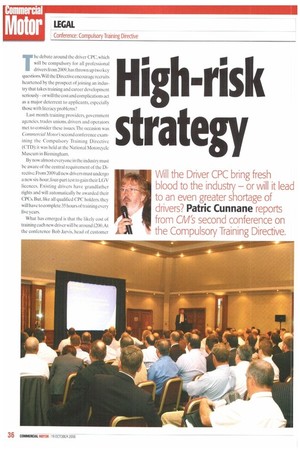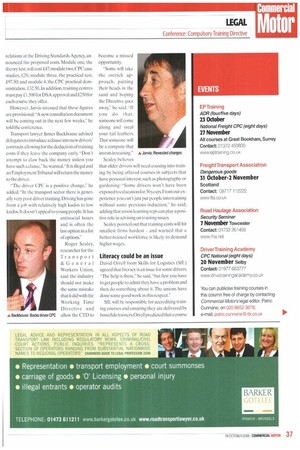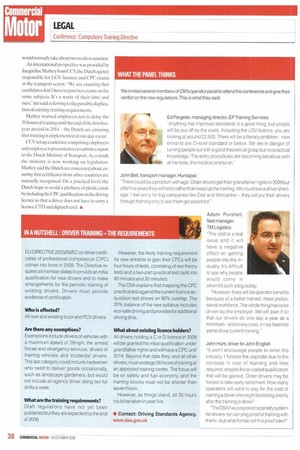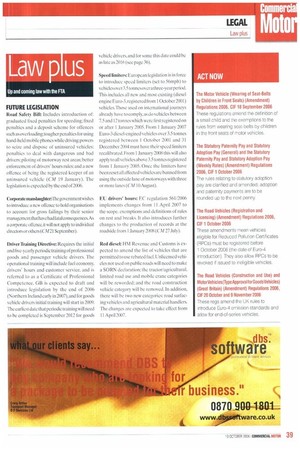High-risk strategy
Page 36

Page 37

Page 38

Page 39

If you've noticed an error in this article please click here to report it so we can fix it.
Will the Driver CPC bring fresh blood to the industry — or will it lead to an even greater shortage of drivers? Patric Cunnane reports from CM'S second conference on
the Compulsory Training Directive. debate around the driver CPC, which will be compulsory for all professional drivers from 2009, has thrown up two key
questions.Will the Directive encourage recruits heartenedby the prospect of joining an industry that takes training and career development seriously or will the cost and complications act as a major deterrent to applicants, especially those with literacy problems?
Last month training providers, government agencies, trades unions, drivers and operators met to consider these issues. The occasion was Commercial Motor's second conference examining the Compulsory Training Directive (CM); it was held at the National Motorcycle Museum in Birmingham.
By now almost everyone in the industry must be aware of the central requirement of the Directive.From 2009 all new drivers must undergo a new six-hour, four-part test to gain their LGV licences. Existing drivers have grandfather rights and will automatically be awarded their CFCs. But, like all qualified CPC holders, they will have to complete 35 hours of training every five years. What has emerged is that the likely cost of training each new driver will be around £200.At the conference Bob Jarvis, head of customer
relations at the Driving Standards Agency, announced the proposed costs. Module one, the theory test, will cost £47; module two, CPC case studies, £28; module three, the practical test, £97.50; and module 4. the CPC practical demonstration.132.50. In addition, training centres must pay £1 ,500 for DSA approval and £250 for each course they offer.
However. Jarvis stressed that these figures are provisional:"A new consultation document will be coming out in the next few weeks," he told the conference.
Transport lawyer James Backhouse advised delegates to introduce a clause into new drivers' contracts allowing for the deduction of training costs if they leave the company early. "Don't attempt to claw back the money unless you have such a clause." he warned."It is illegal and an Employment Tribunal will return the money to the driver. "The driver CPC is a positive change," he added. "In the transport sector there is generally very poor driver training. Driving has gone from a job with relatively high kudos to low kudos. It doesn't appeal to young people. It has
antisocial hours and is often the last option in a list of options." Roger Sealey, researcher for the Transport &General Workers Union, said the industry should not make the same mistake that it did with the Working Time Directive and allow the CTD to
become a missed opportunity.
"Some will take the ostrich approach, putting their heads in the sand and hoping the Directive goes away," he said. "If you do that. someone will come along and steal your tail feathers. That someone will be a company that invests in training." Sealey believes
that older drivers will need coaxing into training by being offered courses in subjects that have personal i merest, such as photography or gardening: "Some drivers won't have been exposed to education for 30 years. From our experience you can't just put people into training without some previous induction." he said, adding that union learning reps can play a positive role in advising on training issues.
Sealey pointed out that training costs will hit smallest firms hardest and warned that a better-trained workforce is likely to demand higher wages.
Literacy could be an issue
David rrel I from Skills for Logistics (SfL) agreed that literacy is an issue for some drivers, "The help is there," he said. "but first you have to get people to admit they have a problem and then do something about it. The unions have done some good work in this respect." SfL will be responsible for accrediting training courses and ensuring they are delivered by bona fide trainers;Orrellpredicted that a course
would normally take about Two weeks to sanction.
An international perspective was provided by Jacqueline Mathey from CCV, the Dutch agency responsible for LGV licences and ('PC exams in the transport sector. "We are ensuring that candidates don't have to pass two exams on the same subjects. It's a waste of their time and ours," she said, referring to the possible duplication of existing training requirements.
Mathey warned employers not to delay the 35 hours of training until the end of the first fiveyear period in 2014the Dutch are ensuring that training is implemented at one day a year. CCV set up a task force comprising employers and employee representatives to submit a report to the Dutch Ministry of Transport. As a result the ministry is now working on legislation. Mathey said the Dutch are concerned about ensuring that certificates from other countries are mutually recognised. On a practical level, the Dutch hope to avoid a plethora of plastic cards by including the CPC qualification on the driving licence so that a driver does not have to carry a licence, CID and digitach card. •
EVENTS
EP Training ADR (four/five days) 23 Odober National Freight CPC (eight days) 27 November All courses at Great Bookham, Surrey Contact: 01372 450800 www.eptratning.co.uk FreightTransport Association Dangerous goods 31 October-2 November Scotland Contact: 08717 112222 www.fta.co.uk Road Haulage Association Security Seminar 7 November Towcester Contact: 01733 261456 \,vvvev.rha.net DriverTraining Academy CPC National (eight days) 20 November Selby Contact: 01977 663777 \Amu drivetrainIngaeademy.co.uk You can publicise training courses in this column free of charge by contacting Commercial Motor's legal editor, Patric Cunnane, on 020 8652 3678; e-mail, patric.cunnane© rbi.cauk
WHAT THE PANEL THINKS
We invited several members of CM'soperator panel to attend the conference and give their verdict on the new regulations. This is what they said: Ed Pargeter, managing director, EP Training Services
-Anything that improves standards is a good thing, but people will be put off by the costs. Including the LGV licence, you are looking at around £2,500. There will be a literacy problem new entrants are 0-level standard or below. We are in danger of turning people out with a good theoretical grasp but no practical knowledge. The entry procedures are becoming laborious with all the tests, the medical and so on." John Bell, transport manager, Huntapac
"There could be a problem with age. Older drivers get their grandfather rights in 2009 but after f ive years they will retire rather than keep up the training. We could see a driver shortage. I feel sorry for big companies like Exel and Wincanton they will put their drivers through training only to see them get poached." Adam Purshell, fleet manager, TM Logistics "The cost is a real issue and it will have a negative effect on getting people into the industry. It's difficult to see why people would come in
when it's such a big outlay.
"However, there will be operator benefits because of a better trained, more professional workforce. The whole thing has to be driven by the employer. We will plan it so that our drivers do one day a year as a minimum and in any case, it may feed into some of our current training." John Hunt, driver for John English
"It won't encourage people to enter this industry. I foresee the opposite due to the increase in cost of learning and time required, despite the so-called qualification that will be gained. Older drivers may be forced to take early retirement. How many operators will want to pay for the cost of training a driver who might be retiring shortly after the training is done?
"The DSA has proposed a penalty system for drivers not carrying proof of training with them but what format will this proof take?"
IN A NUTSHELL: DRIVER TRAINING —THE REQUIREMENTS
EU DIRECTIVE 2003/59/EC on driver certif icates of professional competence (CPC) comes into force in 2009. The Directive requires all member states to provide an initial qualification for new drivers and to make arrangements for the periodic training of existing drivers. Drivers must provide evidence of certification.
Who is affected?
All new and existing truck and PCV drivers.
Are there any exemptions?
Exemptions include drivers of vehicles with a maximum speed of 28mph; the armed forces and emergency services; drivers of training vehicles; and 'incidental' drivers. This last category could include tradesmen who need to deliver goods occasionally, such as landscape gardeners, but would not include an agency driver doing two full shifts a week. What are the training requirements? Draft regulations have not yet been published but they are expected by the end of 2006,
However, the likely training requirement for new entrants to gain their CPCs will be four hours of tests, consisting of two theory tests and a two-part practical test (split into 90 minutes and 30 minutes).
The DSA explains that mapping the CPC practical test against the current licence acquisition test shows an 80% overlap. The 20% balance of the new syllabus includes eco-safe driving and provides for additional driving time.
What about existing licence holders?
All drivers holding a C or licence in 2009 will be granted the initial qualification under grandfather rights and will have a CPC until 2014. Beyond that date they, and all other drivers, must undergo 35 hours of training at an approved training centre. The focus will be on safety and fuel economy, and the training blocks must not be shorter than seven hours.
However, as things stand, all 35 hours could be taken in year five. • Contact: Driving Standards Agency, www.dsa.gov.uk
Up and coming law with the R-A
FUTURE LEGISLATION
Road Safety Bill: Includes introduction of: graduated fixed penalties for speeding: fixed penalties and a deposit scheme for offences such as overloading; tougher penalties for using hand-held mobile phones while driving;powers to seize and dispose of uninsured vehicles; penalties to deal with dangerous and bad drivers; piloting of motorway rest areas: better enforcement of drivers' hours rules; and a new offence of being the registered keeper of an uninsured vehicle (CM 19 January). The legislation is expected by the end of 2006.
Corporate manslaughter:The government wishes to introduce a new offence to hold organisations to account for gross failings by their senior management tha t have had fatal consequences. As a corporate offence, it will not apply to individual directors or others (CM 21 September). Driver Training Directive: Requires the initial and five-yearly periodic training of professional goods and passenger vehicle drivers. The operational training will include fuel economy, drivers' hours and customer service, and is referred to as a Certificate of Professional Competence. GB is expected to draft and introduce legislation by the end of 2006 (Northern Ireland early in 2007),and for goods vehicle drivers initial training will start in 2009. The earliest date that periodic training will need to be completed is September 2012 for goods
vehicle drivers, and for some this date could be as late as 2016 (see page 36).
Speed limiters: European legislation is in force to introduce speed limiters (set to 56mph) to vehiclesover3.5 tonnes overa three-year petiod. This includes all new and most existing (diesel engine Euro-3, registered from 1 October 2001) vehicles. Those used on international journeys already have to comply, as do vehicles between 7.5 and 12 tonnes which were first registered on or after 1 January 2005. From I January 2007 Euro-3 diesel-engined vehicles over 3.5 tonnes registered between 1 October 2001 and 31 December 2004 must have their-speed limiters recalibrated. From 1 January 2008 this will also apply to all vehicles above 3.5 tonnes registered from 1 January 2005. Once the limiters have been reset all affected vehicles are banned from using the outside lane of motorways with three or more lanes (CM 10 August).
EU drivers' hours: EC regulation 561/2006 implements changes from 11 April 2007 to the scope. exemptions and definitions of rules on rest and breaks. It also introduces further changes to the production of records at the roadside from 1 January 2008 (CM 27 July).
Red diesel: HM Revenue and Customs is expected to amend the list of vehicles that are permitted to use rebated fuel. Unlicensed vehicles not used on public roads will need to make a SORN declaration; the tractor/agricultural. limited road use and mobile crane categories will be reworded; and the road construction vehicle category will be removed. In addition, there will be two new categories: road surfacing vehicles and agricultural material handlers. The changes are expected to take effect from 11 April 2007.
ACT NOW
The Motor Vehicle (Wearing of Seat-Belts by Children in Front Seats) (Amendment) Regulations 2006, CIF 18 September 2006 These regulations amend the definition of a small child and the exemptions to the rules from wearing seat-belts by children in the front seats of motor vehicles. The Statutory Paternity Pay and Statutory Adoption Pay (General) and the Statutory Paternity Pay and Statutory Adoption Pay (Weekly Rates) (Amendment) Regulations 2006, CIF 1 October 2006
The rules relating to statutory adoption pay are clarified and amended: adoption and paternity payments are to be rounded up to the next penny. The Road Vehicles (Registration and Licensing) (Amendment) Regulations 2006, CIF 1 October 2006
These amendments mean vehicles eligible for Reduced Pollution Certificates (RPCs) must be registered before 1 October 2006 (the date of Euro-4 introduction). They also allow RPCs to be revoked if Issued to Ineligible vehicles. The Road Vehicles (Construction and Use) and Motor Veh icles (Type Approval for GoodsVehicles) (Great Britain) (Amendment) Regulations 2006, CIF 20 October and 9 November 2006
These regs amend the UK rules to introduce Euro-4 emission standards and allow for end-of-series vehicles.


























































































































































































